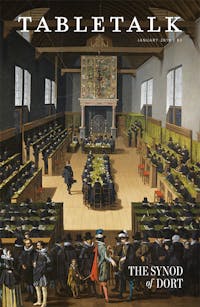
Request your free, three-month trial to Tabletalk magazine. You’ll receive the print issue monthly and gain immediate digital access to decades of archives. This trial is risk-free. No credit card required.
Try Tabletalk NowAlready receive Tabletalk magazine every month?
Verify your email address to gain unlimited access.
Everyone has a creed. Even those Christians who claim that their “only creed is Christ” have a creed, because the very moment they begin to explain what they believe about Christ, they are in fact reciting their creed about Christ. In truth, it’s impossible not to have a creed. So, the question is this: Is our creed carefully formulated and written down, biblically and doctrinally orthodox, and attested to by faithful forefathers of the church? Or is it based on our own authority and clever invention, always changing according to the last internet post we read or according to our own doctrinal whims?
If indeed we are Christians, we will care what we believe and, therefore, what we confess in our creed, for what we believe is the very basis of whether we are biblically orthodox or whether we’re heretics. The historic Reformed creeds and confessions summarize and systematically articulate what the Word of God teaches us, to the end that we might glorify God and enjoy Him forever. If we care about what we believe, we will care about the historic creeds and confessions of the church, and we will care about what happened in the Netherlands four hundred years ago and how the Reformed church responded.
After the death of professor Jacobus Arminius in 1609, his students took some of his thoughts and many of their own and protested the long-established doctrines of the Reformed church. These protesters, or Remonstrants, drafted five points of doctrinal disagreement with the Reformed church. Their five points were nothing new. They were some of the same old Pelagian heresies dressed in seventeenth-century garb. In response to their unorthodox doctrinal formulations, a synod was held in Dordrecht in 1618–19 to combat their false teaching. The synod produced the Canons of Dort, which are consistent with the Belgic Confession (1561) and the Heidelberg Catechism (1563). These documents are known as the Three Forms of Unity, and the Reformed church has heartily affirmed them through the centuries to the end that the church might continue to know and worship the one, true God who made us in His image, and not the god we made in ours.
